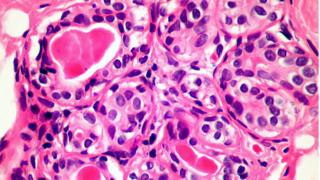
 Image copyright Science Photo Library Image caption The brand-new method might kill a vast array of cancer cells, consisting of breast and prostate A newly-discovered part of our immune system might be utilized to deal with all cancers, say researchers.
Image copyright Science Photo Library Image caption The brand-new method might kill a vast array of cancer cells, consisting of breast and prostate A newly-discovered part of our immune system might be utilized to deal with all cancers, say researchers.The Cardiff University team discovered a technique of eliminating prostate, breast, lung and other cancers in laboratory tests.
The findings, released in Nature Immunology, have not been tested in clients, however the researchers say they have “enormous capacity”.
Professionals said that although the work was still at an early stage, it was very interesting. Our immune system is our body’s natural defence against infection, however it also assaults malignant cells The scientists were searching for “non-traditional” and formerly undiscovered methods the immune system naturally attacks tumours. What they discovered was a T-cell inside people’s blood. This is an immune cell that can scan the body to assess whether there is a risk that requires to be eliminated. The difference is this one could assault a vast array of cancers. ” There’s a chance here to treat every client,” researcher Prof Andrew Sewell informed the BBC. He included: “Previously no one believed this could be possible. ” It raises the possibility of a ‘one-size-fits-all’ cancer treatment, a single type of T-cell that could be efficient in ruining several types of cancers across the population.” T-cells have “receptors” on their surface that enable them to “see” at a chemical level. The Cardiff team found a T-cell and its receptor that could discover and kill a vast array of cancerous cells in the laboratory consisting of lung, skin, blood, colon, breast, bone, prostate, ovarian, kidney and cervical cancer cells. Crucially, it left regular tissues untouched. < figure of every cell in the body. It is thought MR1 is flagging the distorted metabolic process going on inside a cancerous cell to the body immune system.” We are the very first to describe a T-cell that discovers MR1 in cancer cells- that hasn’t been done in the past , this is the very first of its kind,” research fellow Garry Dolton told the BBC. Why is this significant? T-cell cancer therapies already exist and the advancement of cancer immunotherapy has been one of the most interesting advances in the field. The most well-known example is CAR-T- a living drug made by genetically engineering a client’s T-cells to look for and destroy cancer. CAR-T can have significant results that change some clients from being terminally ill to being in complete remission. The method is highly specific and works in just a limited number of cancers where there is a clear target to train the T-cells to spotFind And it has actually struggled to have any success in “solid cancers” – those that form tumours instead of blood cancers such as leukaemia. The scientists say their T-cell receptor might result in a” universal” cancer treatment. So how would it work in practice? The idea is that a blood sample would be drawn from a cancer client. Their T-cells would be drawn out and then genetically customized so they were reprogrammed to make the cancer-finding receptor. lab and after that returned into the patient. It is the very same process used to make CAR-T treatments. T-cells assault cancer cells. T-cell cancer therapies currently exist and the development of cancer immunotherapy has actually been one of the most exciting advances in the field. The most well-known example is CAR-T- a living drug made by genetically engineering a patient’s T-cells to seek out and destroy cancer. The idea is that a blood sample would be taken from a cancer patient. Lucia Mori and Gennaro De Libero, from University of Basel in Switzerland, stated the research had” great possible” but was at too early a stage to state it would work in all cancers. The research study has actually been evaluated only in animals and on cells in the lab, and more security checks would be needed before human trials could begin. What do the specialists say? Lucia Mori and Gennaro De Libero, from University of Basel in Switzerland, said the research had” fantastic possible” but was at too early a stage to state it would operate in all cancers.” We are very excited about the immunological functions of this brand-new T-cell population and the potential use of their TCRs in tumour cell therapy, “they said. Daniel Davis, a professor of immunology at the University of Manchester, said:” At the moment, this is extremely fundamental research study and not near real medications for patients.” There is no question that it’s an extremely interesting discovery, both for advancing our fundamental knowledge about the body immune system and for the possibility of future new medicines.” Follow James on Twitter.What have they found?
How does it work?
class=” media-landscape has-caption full-width” >
from WordPress http://troot.net/immune-discovery-may-treat-all-cancer-bbc-news/
Keine Kommentare:
Kommentar veröffentlichen